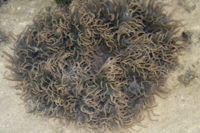Difference between revisions of "Macrodactyla doreensis"
From The Aquarium Wiki
| Line 59: | Line 59: | ||
*[http://www.freshmarine.com/long-tentacle-anemone.html Fresh Marine] | *[http://www.freshmarine.com/long-tentacle-anemone.html Fresh Marine] | ||
*[http://www.peteducation.com/article.cfm?cls=16&cat=1897&articleid=2152 Pet Education] | *[http://www.peteducation.com/article.cfm?cls=16&cat=1897&articleid=2152 Pet Education] | ||
| + | *[http://eol.org/pages/2549779/overview EOL] | ||
[[Category:Invertebrates (Saltwater)]] | [[Category:Invertebrates (Saltwater)]] | ||
[[Category:Anemones]] | [[Category:Anemones]] | ||
Revision as of 06:53, 6 January 2018
Long Tentacle Anemone
Macrodactyla doreensis
379 Litres (100 US G.)
38.1-50.8cm (15-20 ")
8.1 - 8.4
23 -25 °C (73.4-77°F)
8-18 °d
12-25 years
Contents
Alternative names
- Corkscrew Anemone, Long Tentacle Red Base Anemone, Purple Long Tentacle Anemone, Red Base Anemone, Sand Anemone
Origin
- From Japan to Australia.
Tank compatibility
- The Long Tentacle Anemone does best when it is the only Long Tentacle Anemone. The exception to this are clones. This is an anemone that is a host to the Amphiprion perideraion, Amphiprion clarkii, Premnas biaculeatus, Amphiprion percula, Amphiprion polymus.
Diet
- Frozen foods, small pieces of fish, crustaceans, zooplankton, phytoplankton, and mussels.
Feeding regime
- About three times a week with a baster or a refugium that is incorporated with the tank.
Environment Specifics
- The Long Tentacle Anemone requires at least 10.2cm (4") of deep sand substrate in order to attach itself. Once attached, it rarely moves. In the wild, the Long Tentacle Anemone lives in shallow water, which is a good indicator of the high intensity light it requires. The tank needs to be large enough to allow the anemone to have open space around it to protect the other inhabitants from its powerful sting. Needs an SG of 1.023 – 1.025.
Behaviour
- The Long Tentacle Anemone rarely moves around the tank unless it is unhappy with its surrounding, which is a bad sign.
Identification
- The base is usually orange to red but it has various colour patterns and forms. The oral disc is flared widely and with prominent white radial lines. The spaced tentacles are up to 15.2cm (6") long, corkscrew-like, and tipped with nematocyst, stinging cells. It can grow up to 50.8cm (20") in diameter. The mouth, which is located in the centre of the body, is also used to expel waste.
